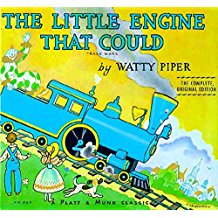Books |
The Little Engine That Could
Watty Piper, with illustrations by George and Doris Hauman
By
Published: May 06, 2018
Category:
Children
So I’m walking on the rubberized track in the park near my apartment. And there, just ahead of me, is a tall man. His son is with him, on his scooter. The boy is no more than 4 years old. This isn’t their first time around the track this morning, and the boy is clearly tired — he stops and hangs his head. Whereupon his father says, “It’s all a matter of will.”
What a thing to say to a small child.
Did the kid understand?
No matter — the father was planting the seed of a big idea. Because much of life is a matter of will. It’s often the difference between success in sports, in business, maybe even in love. In moments of crisis or great danger, it can be the difference between life and death.
Al Pacino tells the story of the first big part he got. After, an actor who didn’t get the role said, “I’m as good as you, Al. Why did you get it and I didn’t?” Pacino replied, “Luck.” Later, he understood that wasn’t the real answer. This was: “The other guy wanted the part. I had to have it.” In other words: will.
And then I thought of one of the most influential books of my life. 48 pages. Picture-and-text. A board book. I’m guessing my mother read it to me when I was the age of that boy on the track. Of course: “The Little Engine That Could.” [To buy it from Amazon, click here.]
You recall the story. A train needs to deliver its cargo of toys and food and candy to children on the other side of a mountain. It breaks down. It can’t go on. It needs help.
Along comes a shiny new engine. But it’s snooty — it pulls sleeping cars and a dining car with waiters. “Pull the likes of you? Indeed not!” And it chugs away.
Another engine pulls up. It pulls heavy machines — it’s just as self-important as the first engine. And it too chugs away.
A rusty old engine comes along. But it’s old and tired. It can’t help.
And then a little blue engine arrives. He’s not big. He’s never been over the mountain. But he thinks he can. He hitches himself to the train. And — slowly — they start up the mountain.
What does he say as he struggles to conquer the mountain?
“I think I can… I think I can… I think I can.”
And when he succeeds? “I thought I could…. I thought I could…. I thought I could.”
Will.
The story is an old one, dating from the start of the last century. It was first published in the United States in 1930, with memorable illustrations by George and Doris Hauman. It quickly became a classic.
There’s been some question recently about the gender politics of the book. The engine that falters is pinkish red. The engine that rescues the stalled train is blue. Female weakness? Male heroism? I can’t begin to say. But I throw up my hands on the question of patriarchal attitudes in children’s books in 1930.
A far more interesting way to look at the story: The train with “dining cars with waiters” is reserved for the rich; it cares not at all about the weak and hurt. The second represents know-nothing, falsely superior men. It’s got no empathy. The engine that helps? It’s neglected, overlooked. But it helps. Because when the poor need help, they get it from those with heart and compassion — from people who understand: other poor people.
Maybe.
But I’m not of the opinion that today’s little kids see this as a fable about gender and power. I think they get what I got, all those years ago: If you think you can… you can. And I think if I were looking for a gift book for a pre-schooler, I’d start here.


